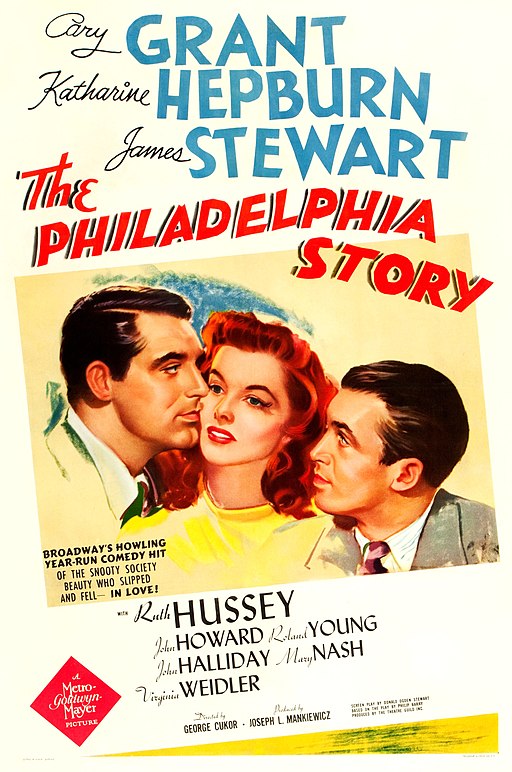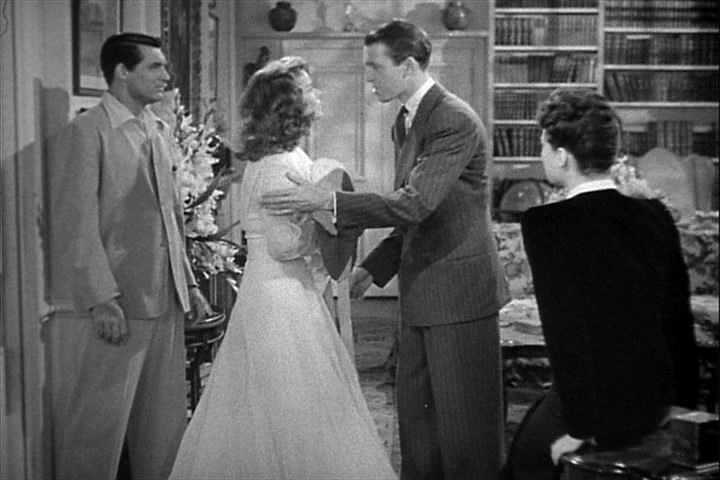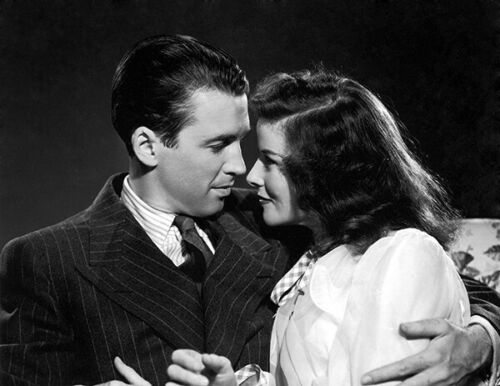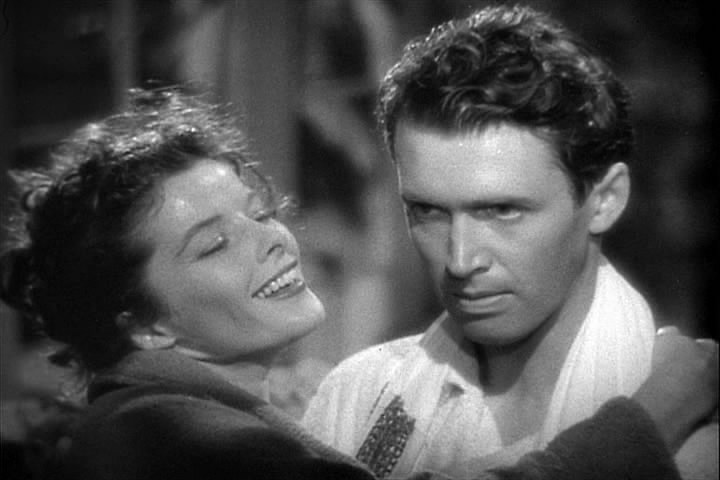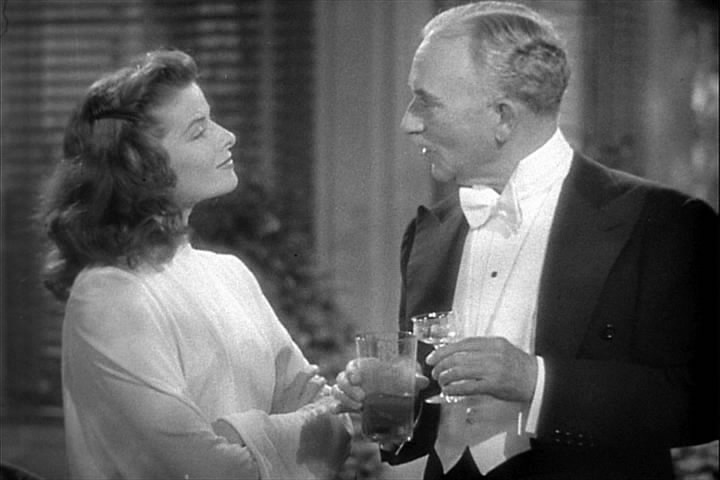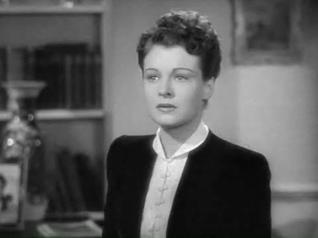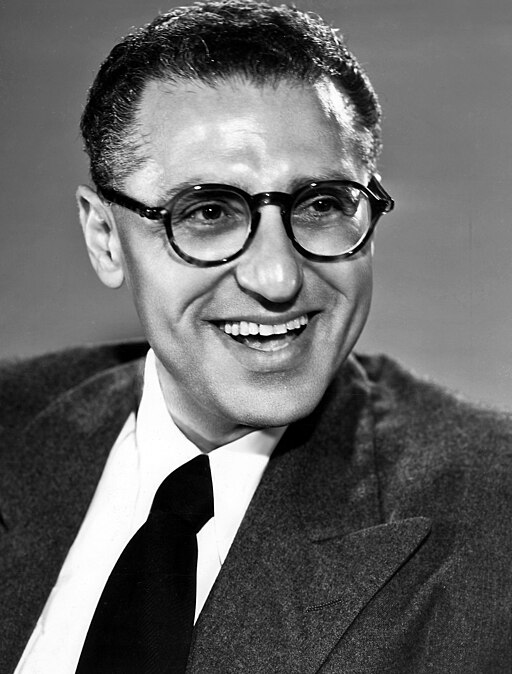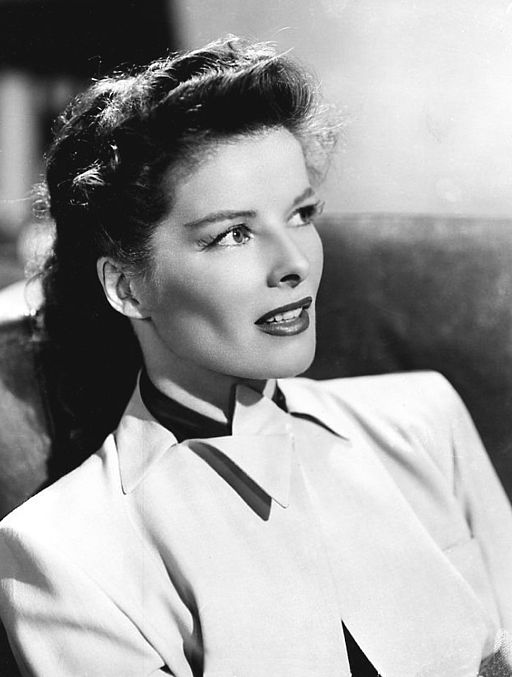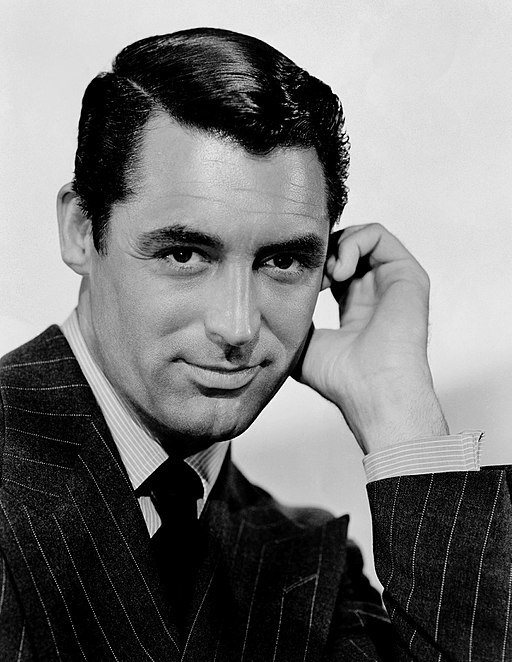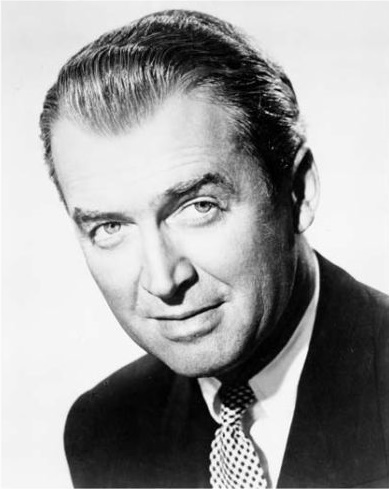The Philadelphia Story - 1939
back| Released by | Metro-Goldwyn-Mayer |
| Director | George Cukor |
| Producer | Joseph L. Mankiewicz |
| Script | Donald Ogden Stewart, based on the play by Philip Barry |
| Cinematography | Joseph Ruttenberg |
| Music by | Franz Waxman |
| Running time | 112 minutes |
| Film budget | $ 910.000,- |
| Box office sales | $3 million |
| Main cast | Katharine Hepburn - Cary Grant - James Stewart - Ruth Hussey - John Howard |
The Philadelphia Story
A Witty, Romantic but Critical Masterpiece
"The Philadelphia Story" was notable for its witty script and the outstanding performances of its lead actors.
Katharine Hepburn's role as Tracy Lord was particularly significant in revitalizing her career at the time. The film was both a critical and commercial success, and it remains a beloved classic in the romantic comedy genre.
Related
The Philadelphia Story – 1940
"The Philadelphia Story" is a romantic comedy that masterfully blends humor, romance, and a touch of social commentary. Here's a detailed summary and analysis:
Summary
Plot Overview: The film follows Tracy Lord, a wealthy Philadelphia socialite, who is preparing for her second marriage to the reliable but unimaginatively dull George Kittredge. Tracy's plans are thrown into disarray by the arrival of her charming ex-husband, C.K. Dexter Haven, and a pair of reporters, Macaulay Connor and Elizabeth Imbrie, who are covering the wedding for a gossip magazine. Dexter and the reporters, under the guise of friends of Tracy's brother, enter the Lord household.
Key Events:
- Dexter's Arrival: Dexter's return rekindles old feelings and complicates Tracy's feelings about her upcoming nuptials.
- The Reporters: Macaulay (Mike) and Elizabeth provide an outsider's view of the upper-class lifestyle. Mike, in particular, develops a deep fascination and affection for Tracy.
- Pre-Wedding Party: During a party the night before the wedding, Tracy drinks too much, leading to a series of revealing and humorous situations, including a late-night swim with Mike.
- Emotional Revelations: Tracy confronts her own flaws, particularly her unforgiving nature and high standards. Mike confesses his love for her, and Dexter reveals his continued affection.
- The Wedding Day: On the day of the wedding, Tracy decides she cannot marry George. In a twist, she reunites with Dexter, realizing he truly understands and accepts her.
Analysis
Themes:
- Class and Society: The film explores the lives of the wealthy elite, juxtaposing them with characters from lower social classes. It subtly critiques the superficiality and expectations of high society.
- Self-Discovery and Growth: Tracy's journey is one of self-discovery. She learns to accept her imperfections and understand the true nature of love and forgiveness.
- Love and Romance: The story challenges traditional views of romance, suggesting that true love accepts flaws and embraces growth.
Character Development:
- Tracy Lord: Initially portrayed as haughty and perfection-seeking, Tracy evolves into a more self-aware and compassionate character.
- C.K. Dexter Haven: Dexter's character serves as a catalyst for Tracy's change, showing patience and understanding toward her.
- Macaulay Connor: As an outsider, Mike offers a fresh
perspective on the upper class and falls for Tracy, further complicating her emotions.
Style and Tone:
- The film is characterized by sharp, witty dialogue and fast-paced interactions, typical of screwball comedies of the era.
- It balances light-hearted romance with deeper insights into human character and social norms.
Cultural Impact:
- "The Philadelphia Story" was groundbreaking in its portrayal of a strong, complex female lead and its critique of high society.
- The film's success helped revitalize Katharine Hepburn's career, who had been labeled "box office poison" prior to this.
Official Trailer of The Philadelphia Story:
Full Cast of “The Philadelphia Story”:
- Katharine Hepburn as Tracy Lord
- Cary Grant as C.K. Dexter Haven
- James Stewart as Macaulay "Mike" Connor
- Ruth Hussey as Elizabeth Imbrie
- John Howard as George Kittredge
- Roland Young as Uncle Willie
- John Halliday as Seth Lord
- Mary Nash as Margaret Lord
- Virginia Weidler as Dinah Lord
- Henry Daniell as Sidney Kidd
- Lionel Pape as Edward
- Rex Evans as Thomas
- King Baggot as Elsie's Escort (uncredited)
- Hillary Brooke as Main Line Society Woman (uncredited)
- Veda Buckland as Elsie (uncredited)
- Lita Chevret as Manicurist (uncredited)
- Russ Clark as Mac (uncredited)
- David Clyde as Macaulay's Butler (uncredited)
- Clyde Cook as Old Drunk (uncredited)
- Robert De Bruce as Lords' Butler (uncredited)
- Dorothy Fay as Main Line Society Woman (uncredited)
- Claude King as Uncle Willie's Butler (uncredited)
- Eric Mayne as Wedding Guest (uncredited)
- Florine McKinney as Main Line Society Woman (uncredited)
- Lee Phelps as Bartender (uncredited)
- Hilda Plowright as Librarian (uncredited)
- Joseph Romantini as Musician at Wedding (uncredited)
- Helene Whitney as Main Line Society Woman (uncredited)
Was the Movie based on a True Story?
No, "The Philadelphia Story" was not based on a true story. It was adapted from a Broadway play of the same name written by Philip Barry. The play, and subsequently the film, were works of fiction.
However, the character of Tracy Lord, played by Katharine Hepburn in the film, was said to be inspired by Helen Hope Montgomery Scott, a Philadelphia socialite known for her vivacious personality and glamorous lifestyle.
Despite this inspiration, the plot and characters of "The Philadelphia Story" are purely fictional and were created for the purposes of entertainment and storytelling.
Analysis of the Directing Style of George Cukor:
George Cukor's direction in "The Philadelphia Story" is a testament to his mastery in handling sophisticated comedies and character-driven narratives. Here's an analysis of his directorial approach:
Emphasis on Character and Dialogue
Cukor was known as an "actor's director," and this is evident in "The Philadelphia Story." He gave his actors the space to explore and embody their characters deeply, resulting in performances that were nuanced and layered. Cukor's ability to draw out subtle emotional nuances and expressions is a hallmark of his direction. He focused on the witty, fast-paced dialogue characteristic of screwball comedies, ensuring that the verbal sparring was as much a part of the character development as their actions.
Visual Storytelling
While Cukor’s films are often noted for their strong scripts and performances, his visual storytelling in "The Philadelphia Story" also stands out. He used the camera to enhance the narrative, employing close-ups and medium shots to capture the actors’ expressions and to focus the audience’s attention on the dialogue. His framing often brought multiple characters into focus simultaneously, highlighting their interactions and reactions, which is crucial in a film where the chemistry and dynamics between characters are central.
Pacing and Timing
Cukor’s sense of pacing and timing in "The Philadelphia Story" is impeccable. He balanced the fast-paced, witty exchanges with moments of introspection and emotional depth. This rhythm created a dynamic flow that kept audiences engaged while allowing the story’s more poignant moments to resonate. His ability to manage the pacing ensured that the film never felt rushed nor sluggish, maintaining a balance between comedy and drama.
Handling of Thematic Elements
Cukor skillfully wove the film’s themes of class differences, love, and personal growth into the narrative without being heavy-handed. He allowed the themes to emerge organically through the characters' interactions and personal journeys. His direction made these themes relatable and accessible, ensuring that the film resonated with a wide audience.
Collaboration with Cast and Crew
Cukor’s collaboration with the cast and crew was integral to the film's success. He worked closely with screenwriter Donald Ogden Stewart to bring the wit and charm of Philip Barry's play to the screen. His relationship with the actors, especially Katharine Hepburn, with whom he had a long-standing professional relationship, allowed for a creative synergy that brought out the best in their performances.
Legacy
George Cukor’s direction in "The Philadelphia Story" is a fine example of his overall style and approach to filmmaking. He was adept at creating sophisticated, witty, and emotionally rich films. His focus on character development, combined with his skillful pacing and keen visual sense, made "The Philadelphia Story" a classic of its genre and cemented Cukor's reputation as one of Hollywood's finest directors. His influence can be seen in the way character-driven stories are told in cinema, making him a pivotal figure in the evolution of film narrative and style.
Significant Performance of Katharine Hepburn:
Katharine Hepburn's performance in "The Philadelphia Story" is not only a highlight of her illustrious career but also a pivotal moment in the trajectory of her stardom.
Performance
Character Portrayal: Hepburn played Tracy Lord, a complex character embodying both the sophistication of high society and deep, human vulnerabilities. Hepburn's portrayal was nuanced and multi-dimensional. She captured Tracy's initial haughtiness and her journey towards self-awareness and vulnerability with finesse.
Emotional Range: Hepburn demonstrated a remarkable emotional range in this role. From her sharp-tongued repartee to moments of introspection and confusion, she convincingly portrayed a character undergoing a profound personal transformation. Her ability to switch seamlessly between comedy and drama within the same scene was a testament to her skill as an actress.
Chemistry with Co-Stars: Hepburn's interactions with Cary Grant and James Stewart were crucial to the film's success. Her chemistry with Grant, playing her ex-husband Dexter, was charged with a mix of fondness, irritation, and underlying affection. With Stewart, playing the reporter Mike, she shared a more subtle, evolving connection that was equally compelling.
Commanding Presence: Hepburn's screen presence in "The Philadelphia Story" was commanding. She had the ability to draw the viewer's attention in every scene she appeared in, making Tracy Lord a memorable and iconic character in the history of cinema.
Significance for Hepburn
Career Revival: At the time "The Philadelphia Story" was made, Hepburn's career was at a low point. She had been labeled "box office poison" after a series of commercial failures. This film, which she helped bring to the screen (securing the film rights to the play and handpicking the cast), was a strategic and daring move on her part.
Critical and Commercial Success: The film was a massive success, both critically and commercially. It re-established Hepburn as a leading lady in Hollywood and showcased her versatility as an actress. The role played to her strengths - a blend of aristocratic bearing and a no-nonsense, spirited personality.
Personal Triumph: Beyond just a career revival, "The Philadelphia Story" represented a personal triumph for Hepburn. It was a project she had a significant personal stake in, from its inception to its execution. The success of the film was, in many ways, a validation of her talents and her vision as an artist.
Long-Term Impact: The film had a lasting impact on Hepburn's career, setting the stage for the roles she would take on in the future. It solidified her image as a strong, independent, and sophisticated woman, both on and off the screen. This film began a phase in her career where she had greater control over her roles and how she was portrayed, paving the way for many of her later successes.
Notable Quotes from the Film:
- Macaulay Connor (James Stewart): "I don't want to be worshipped. I want to be loved."
- C.K. Dexter Haven (Cary Grant): "You'll never be a first-class human being or a first-class woman until you've learned to have some regard for human frailty."
- Tracy Lord: "I'm such an unholy mess of a girl."
- Macaulay Connor: "There's a magnificence in you, Tracy."
- C.K. Dexter Haven: "The time to make up your mind about people is never. That's a trap."
- Elizabeth Imbrie (Ruth Hussey): "The moon's reaching for me!"
- Tracy Lord: "Put me in your pocket, Mike."
- Uncle Willie (Roland Young): "Champagne is a great leveler. It levels the mind. We need it tonight."
- C.K. Dexter Haven: "Sometimes, for your own sake, Red, I think you should've stuck to me longer."
- Macaulay Connor: "I thought all writers drank to excess and beat their wives. You know one time I secretly wanted to be a writer."
Awards and Recognition:
Academy Awards (1941)
Won:
- Best Actor: James Stewart (for his role as Macaulay Connor)
- Best Writing, Screenplay: Donald Ogden Stewart (for adapting Philip Barry's play)
Nominated:
- Best Picture: The film was nominated for Best Picture.
- Best Director: George Cukor was nominated for his direction.
- Best Actress: Katharine Hepburn received a nomination for her role as Tracy Lord.
- Best Supporting Actress: Ruth Hussey was nominated for her role as Elizabeth Imbrie.
- Best Cinematography, Black-and-White: Joseph Ruttenberg was nominated for his cinematography work.
Other Recognitions
While the most notable accolades for "The Philadelphia Story" were its Academy Awards, it's important to note that the film also enjoyed critical acclaim and was a commercial success. It's considered a classic in American cinema and has been recognized by various film institutes for its cultural, historical, and aesthetic significance:
- The film has been preserved in the United States National Film Registry by the Library of Congress as being "culturally, historically, or aesthetically significant."
- It has also appeared on various lists of the greatest films ever made, as compiled by prestigious film organizations and critics.

